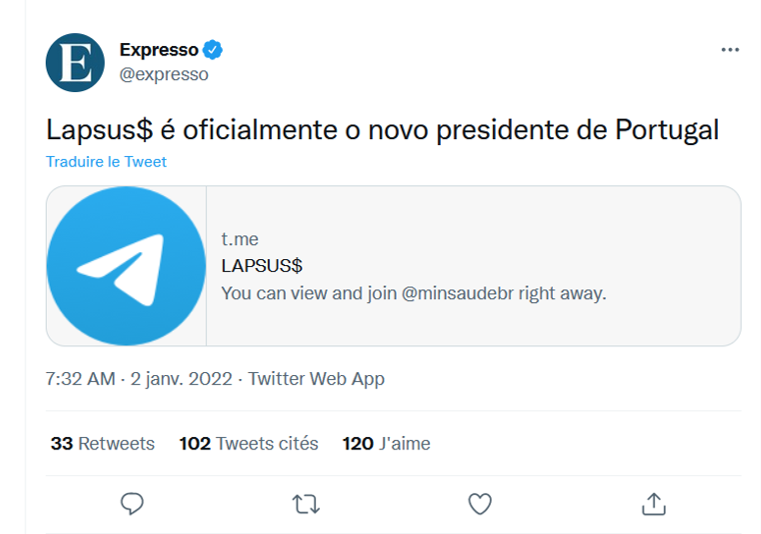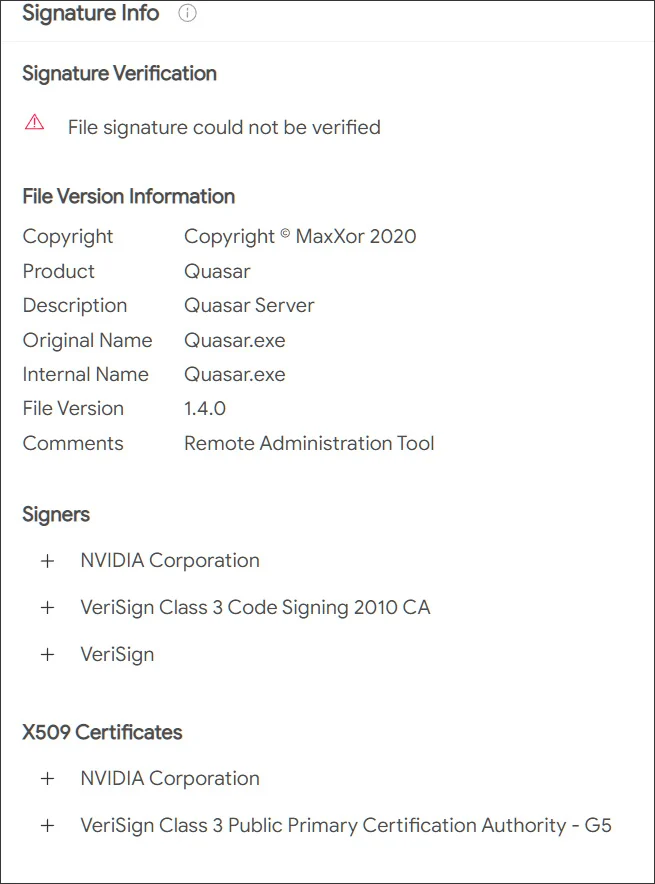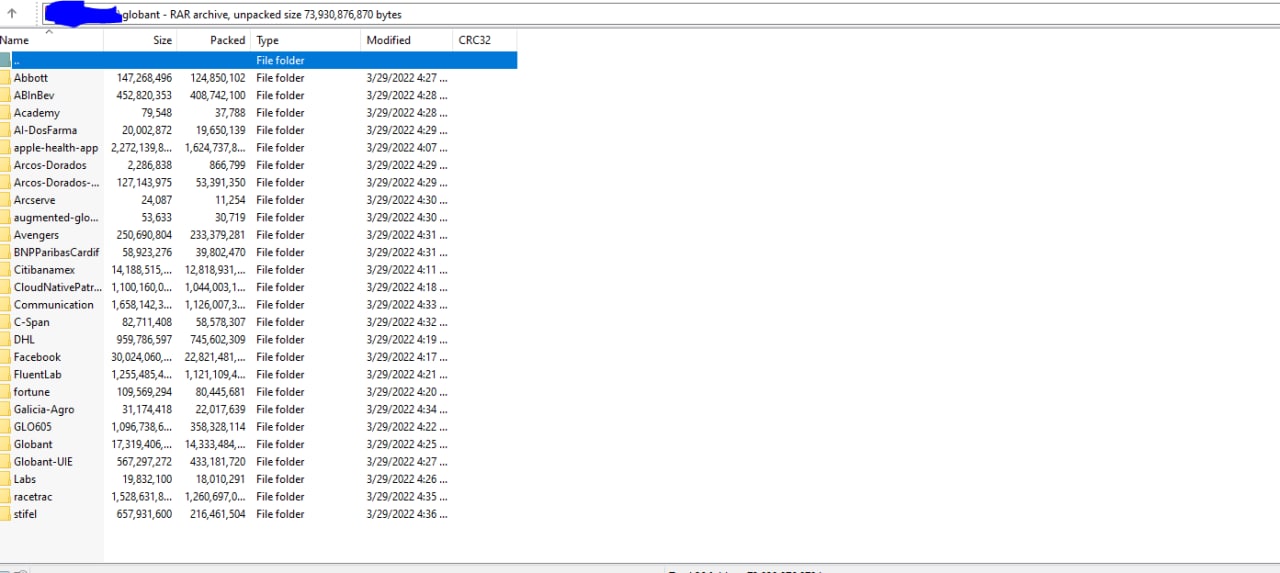If you think your data is safer with big corps, you’re wrong: The story of Lapsus$ hacker group
Today we have somewhat of an unusual digest, we're going to talk about a notorious hacker group called Lapsus$ that's responsible for a number of high-profile cases. And if this topic may seem like it has nothing to do with you — it's only at first glance.
Mr. President
In early January this year, Portuguese mediagroup IMPRESA was targeted by hackers. Mediagroup's child companies — TV channel SIC and newspaper Expresso — were hacked. SIC's streaming got cut off, Expresso's Twitter account was hijacked. Appealing to Expresso's 540,000 followers, the hacker group impertinently declared itself the "new president of Portugal".

Source: Cyber etc. Twitter account
Next in line was Localiza, the biggest car rental service in Latin America. Anyone who visited their website got redirected to a porn website.
The hackers could have easily redirected users to a fake website, visually identical to the original, where the unsuspecting visitors would have voluntarily left all their personal data such as bank accounts' details. Like, for example, it happened to the hacked Instagram page of the NFT project Bored Ape Yacht Club. The hackers used the account to display phishing information and managed to steal over $1 million.
But Lapsus$, apparently, were more interested in attacking the big corp rather than in stealing the personal data of ordinary users.
Going big...
But this was only the beginning. The news about the NVIDIA hack shocked everyone. Among the stolen data were:
- source codes for graphics cards' drivers, including the hashrate limiting technology that makes GPUs less desirable for miners;
- highly confidential information about microchip design, including unreleased ones;
- credentials of 71,000 NVIDIA employees;
- source code for the DLSS rendering system;
- and official code-signing certificates.
The list is long enough but one would think that at least the attack would only affect NVIDIA itself, its competitors, and, perhaps, miners. But this couldn't be further from reality. The signing certificates that were leaked to the web allow to sign any software as NVIDIA's. Any malefactor could use it to sign their virus, for example, and any computer would recognize this virus as perfectly normal NVIDIA software. This has opened a window for all kinds of perpetrators to circumvent Windows' built-in security systems.
And it didn't take long for the stolen certificates to start popping up in the news.

Source: Bleeping computer
...and going even bigger
The group expectantly didn't stop there, its appetites only growing. Samsung was destined to become the next victim. Lapsus$ stole source texts for the loader used in all latest devices, as well as the code responsible for biometrics, authentication, and encryption. In addition, confidential data of Qualcomm, one of Samsung's counterparties, was stolen.
The consequences, especially in the context of Samsung devices' security systems, can be quite disastrous. With high certainty, this data is currently being thoroughly scanned for vulnerabilities, and we can expect to hear about a series of Samsung devices being breached, and sooner rather than later. Evidently, even a single company getting hacked can often lead to more subsequent breaches and more data leakages. We all are forced into picking our poison and "trusting" one company or another with our personal data, but do they deserve this trust?
Meanwhile, Lapsus$ was only starting to gain momentum. Vodafone breach resulted in 200GB of data getting stolen. The company states that user data wasn't affected, and it may well be true, as it hasn't emerged anywhere on the darknet yet and wasn't among the files published by the hackers. It seems that the members of Lapsus$ are more interested in intellectual property than personal data. It doesn't mean that the next big hacker group will have the same preferences, we know plenty of examples when cybercriminals extorted money from regular Internet users. Yes, the sums may be smaller, but the number of potential victims compensates for that.
Gamedev was not spared either. Ubisoft became one of the next targets, and again, the company's data was stolen. We don't know yet what data exactly had been acquired by hackers, but Ubisoft initiated a full password reset for all its employees after the fact. It's unclear what was the hackers' goal this time, it may have simply been a stepping stone for performing larger scale attacks in the future. We can only wait and see if any of the clients' information was stolen too.
There was still room for Lapsus$ to go bigger: Microsoft fell prey next, a lot of source code was stolen, including that of Bing search engine and Cortana voice assistant. Hackers may be keeping the juiciest bites for themselves (e.g. credentials to access infrastructure), but even the share that they have decided to make public is enough to find more vulnerabilities in Microsoft products and exploit them in future breaches.
There are examples when hackers were able to cause some serious damage by gaining access to customer support accounts. Imagine what can be achieved when you have access to security engineers' accounts, know private message history and other details.
What's there to come
But the best illustration to the point we're making today is the breach of the single sign-on provider Okta. To carry out the attack, hackers compromised one of the company's contractors and proceeded to use it to get access to Okta systems. According to the company's statements, hackers stole the laptop of an engineer employed by one of Okta's contractors — talk about secure passwords.
It needs to be mentioned that Okta offers its services to over 15,000 companies around the world. Taking into account the fact that among them there are such giants as Peloton, Sonos, T-Mobile, and even The Federal Communications Commission of the US government, it's a safe bet that we're yet to witness how huge the aftermath of this breach can be.
After Okta, there was Globant breach — a key player in the market of software development consulting․ Around 70GB of data were stolen, and you can see from the screenshot below that among the affected companies are such big names as DHL, Facebook, Apple, C-span, Fortune, Arcserve.

Source: Lapsus$ Telegram channel
Another counterparty targeted, another case, which scale we'll be able to grasp only in the future. It'll greatly depend on which data exactly had been stolen and what the hackers will decide to do with it.
The prodigy
What makes all of this especially intriguing is the fact that the leader (or how cybersec experts often call him, the mastermind and ideologist) behind the Lapsus$ group allegedly is a 16-year-old teenager. And he's not the only one — according to investigators, some of the other supposed members of the group are teenagers as well, and they often turn their attacks into nothing less than a spectacle. How else would you call hacking and joining Zoom meetings and trolling company representatives? All of this adds spice to the story, but also raises a lot of questions to the hacked corporations and their security systems.
If you thought that we're done and there's nothing else to top the above mentioned breaches, here's another one: Apple and Meta voluntarily transferred user data to hackers who impersonated police representatives. The malefactors managed to hijack a police email account, which opened the door to sending urgent inquiries to obtain all kinds of confidential information, and Meta and Apple duly obliged. Despite the fact that the incident only recently got publicity, and that a different group called Recursion Team was responsible, Lapsus$ leader has employed similar techniques. Part of the Recursion Team's roster even (presumably) joined Lapsus$ later under different nicknames when the original group was disbanded.
And the argument that user data wasn't truly compromised doesn't fly with this breach's case. Ask yourself: do you really want to let the government and megacorps know everything about you?
Conclusion
Quite an impressive record for a group that was founded towards the very end of 2021, isn't it? And we haven't even listed all of their achievements. As you could see, smallish companies and tech giants from the top-10s in their respective fields, all fell victim to a bunch of teenagers with laptops. It's hard to convince yourself that they all were cutting costs at the expense of security. Nonetheless, they were all proven to be absolutely susceptible to hacker attacks.
The entire Lapsus$ story is a perfect example to dispel the myth that the bigger the company, the safer your data is with it. As it turns out, those giant corporations often present the juiciest bite. Companies' employees have access to your data, and with a little help from hackers, it may end up in the wrong hands so very easily. So when you're about to say "I've got nothing to hide anyway" the next time, think twice.










































